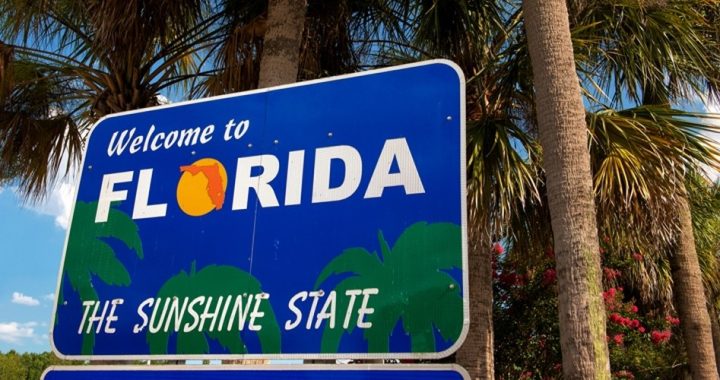
Ponce de Leon didn’t find the Fountain of Youth there. But Florida is finding many new residents, mostly older, to be a fount of funding. It’s the phenomenon whereby wealthy Americans, encouraged by tax code changes, flee high tax-states and take their cash to places that won’t drain them dry.
As Fox Business reports:
As it turns out, however, Florida has been banking on moving trends even prior to the implementation of the new tax law.
According to a new study from LendingTree, which analyzed IRS data from 2016, Florida is the number one largest beneficiary from relocations out of all 50 states — by a landslide.
The Sunshine State drew in a net influx of about $17.7 billion in adjusted gross income (AGI) — most of which (72 percent) came from those aged 55 and older. It is consistently one of the most popular destinations for retirees due to affordability and low taxes.
Florida’s $17.7 billion in net AGI dwarves the remaining 19 states that saw a positive net influx of income — which combined for a total of $19.4 billion.
South Carolina and another no-income tax state — Texas — trailed Florida, with net adjusted income totals around $2.25 billion apiece.
Florida is unique in that it also draws a large proportion of higher net-worth individuals — more than 85 percent of its net inflow of income came from people earning at least six-figures.
As for the losers, New York led the pack, bleeding a whopping $8.8 billion in adjusted gross income from migration.
“Another high-tax state, Connecticut, had the largest income loss relative to its overall economy — at $2.6 billion,” Fox Business also informs. “Connecticut, Pennsylvania, New Jersey, Illinois and New York lost about half of their income from people earning more than $200,000 — indicating the wealthy were picking up and leaving.”
While this is a longstanding trend, it has intensified with the United States tax-code change that caps state and local deductions at $10,000.
Thus catalyzed, “New York contributed the most to Florida’s inflow with 63,722 people moving from New York to Florida,” the U.S. Census Bureau tells us. “The second-highest contributor was Georgia with 38,800 inmovers.”
“California had the most domestic outmovers, with 661,026 people moving to another state within the past year,” the bureau also informs. “The states with the next highest outmigration flows are Texas with 467,338 outmovers, New York with 452,580, and Florida with 447,586.”
The last statistic, showing that almost as many people left Florida as settled there, indicates that the state is trading lower-income residents for wealthier ones.
As for New York, it “faces a $2.3 billion budget deficit that even Democratic Gov. Andrew Cuomo called ‘as serious as a heart attack,’” reported Fox News in March. “‘This is the flip side. Tax the rich, tax the rich, tax the rich,’ Cuomo said last month. ‘We did. Now, God forbid, the rich leave.’”
This didn’t mean Cuomo was wising up and taking responsibility, however. He still blamed President Trump and congressional Republicans for his state’s woes, citing the aforementioned tax code change.
In fact, New York’s response has been to pursue wealthy residents who’ve left its people’s republic; Empire State tax collectors will even go so far as to check their vet bills and refrigerators to try to prove they still legally reside in N.Y. and thus can be taxed.
Yet while it may seem that high-tax states’ loss is low-tax states’ gain, it’s not that simple. For along with their money, well-heeled blue-state residents bring something else: their ideology.
The wealthy have voted Democrat in recent decades, and it’s well-known that the inflow of Californian and Northeastern transplants into southern states has made them more left-wing. This is part of the reason why North Carolina, once a “conservative” bastion, voted for Barack Obama in 2008.
This leftism-carrier phenomenon is common, mind you. It’s also seen in Western Europeans and south-of-the-border Latinos who come to America for a better life, but then proceed to support statists just as they did in their home countries. Of course, if this process continues long enough, these transplants’ adopted state/country will become just like the place they fled.
If this behavior seems unreasonable, it’s because people don’t operate based on reason as much as we might like to think. And to paraphrase British satirist Jonathan Swift, “You cannot reason a man out of a position he has not reasoned himself into.”
But then there’s the matter of not considering all the “data.” When discussing (im)migrants’ impact, people will, in what’s actually a Marxist mistake, behave as if they’re mainly economic beings. How will they affect the job market? Will they add tax revenue or drain the system? What skills and resources will they bring with them? But the most important things newcomers bring with them are their beliefs.
Beliefs are not only ingrained by adulthood, but, unfortunately, also tend to have been shaped by prejudices and other misbegotten emotional attachments. And just as a group won’t come to your country and relinquish its religion — no matter how good or bad it may be — it won’t shed its ideology, either. If people are socialists where they come from, they’ll be socialists wherever they go to.
This is why, when explaining the reason his nation was rejecting European Union immigrationist schemes, a Hungarian government spokesman said in June that they are “not seeking to sustain an economic system.”
They are, he said unabashedly, seeking to sustain “Hungary, the Hungarian nation and Hungarian history.”
The irony, though, is that the economic calculation often just means short-term gain and long-term pain. After all, how can you sustain an economic system if you don’t sustain an electorate capable of sustaining that system?
Image: Ingo Dörenberg via iStock / Getty Images Plus



